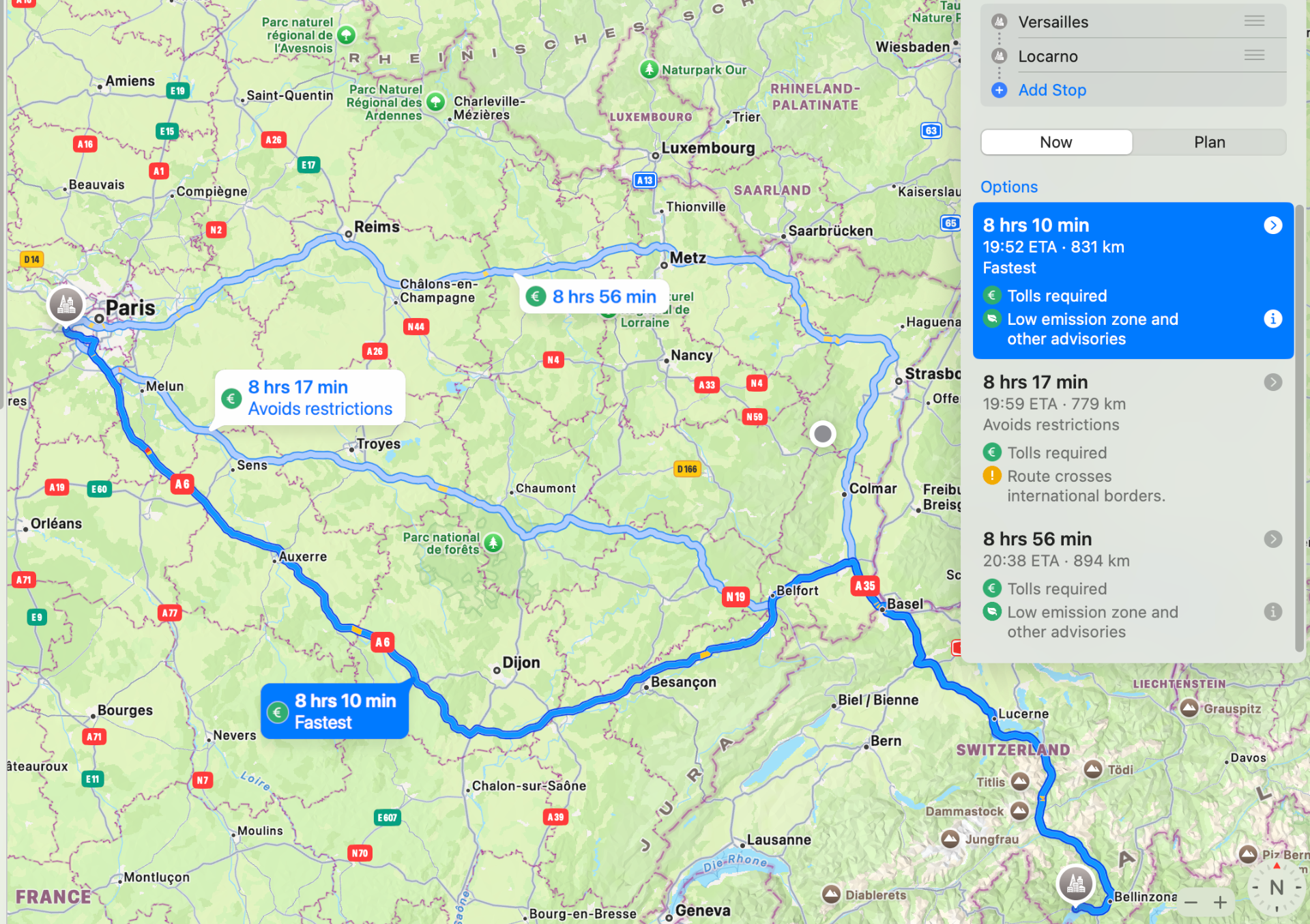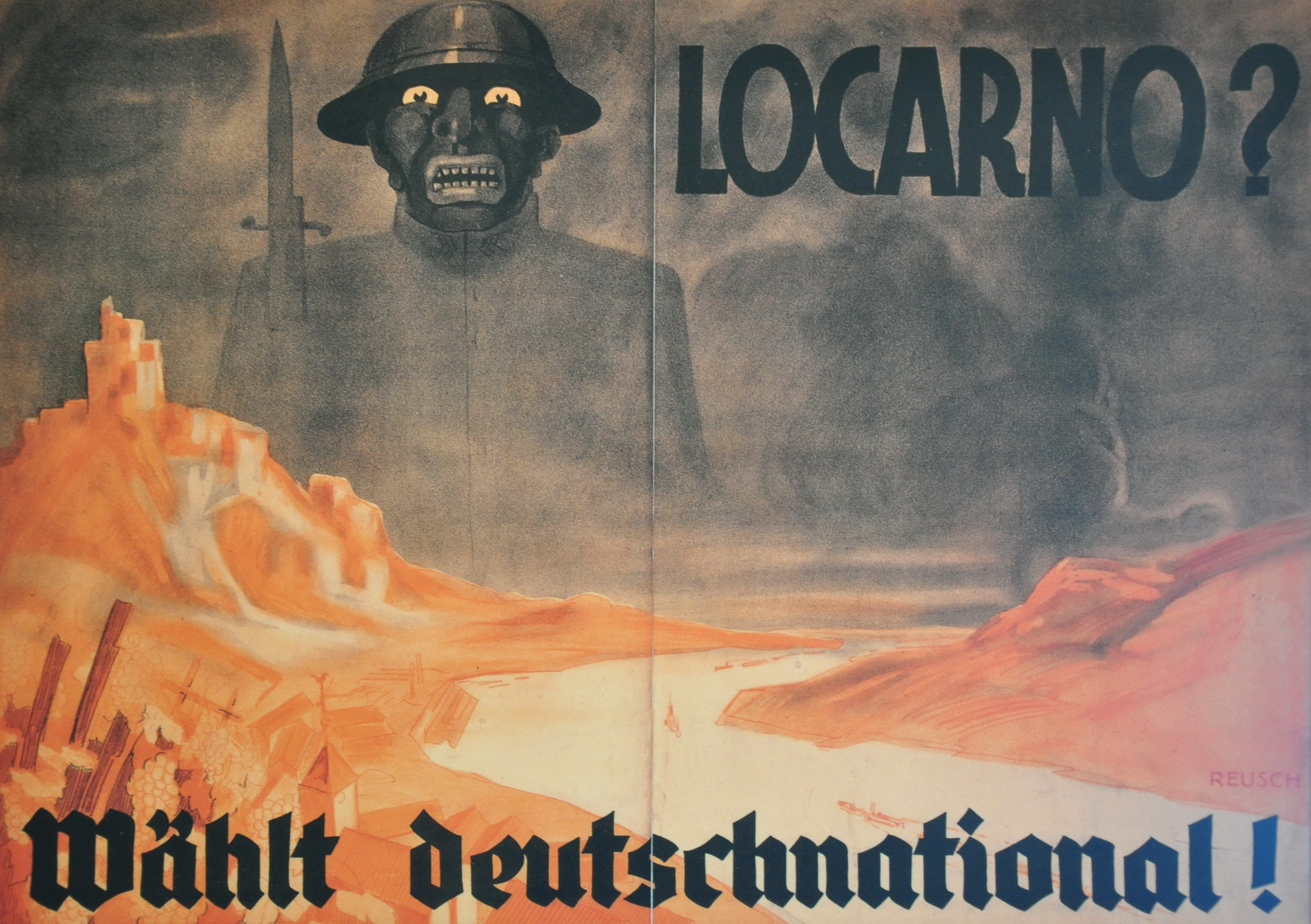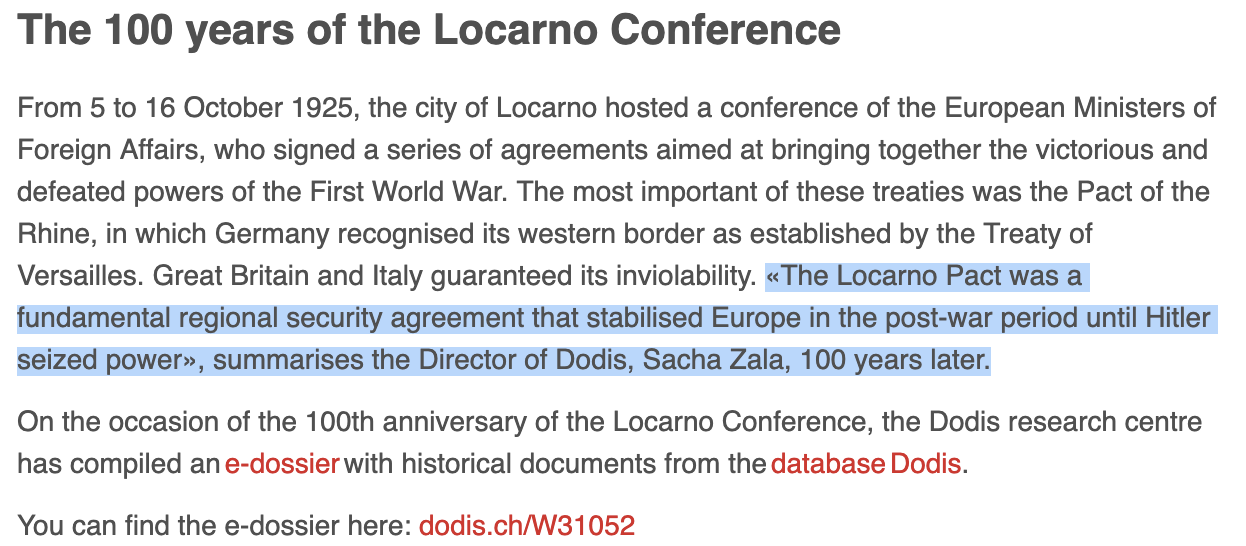Locarno Postcolonial
With war veteran Paul von Hindenburg in his first months as President of the Weimar Republic, another Western treaty on this successor state of the Hohenzollern Empire was worked out in Locarno, Switzerland. At the end of 1923, the new Germany's years of catastrophe prompted incumbents in Paris, London and Berlin to get together to normalize the relationship.1 From a neutral perspective, if not for the benefit of neutrality historiography, the 1919 Versailles diktat should be regarded as a peace endangering anomaly. Like Belgium and Italy, Germany and the Entente powers signed the Locarno Treaties on December 1, 1925, in London, England. How did the Entente and the British-led League take into account Germany's durable insecurity and bid for a substantial revision of the dictated postwar order? In other words, why did Locarno bring about substantially less peace dividend than the preceding Treaty of Lausanne?
Two years later, the Treaties of Locarno followed up on the revisions of Lausanne, named after another city in Switzerland. Turkey's armed resistance against the Treaty of Sèvres (like Versailles part of the Paris Peace Treaties led to Lausanne's quintessential revision of this one out of five diktats.2 For the sake of stabilizing Europe by appeasing a partially occupied as well as militarily disabled Germany, London and Paris took to the alteration of an inclusive conference table. Like in post-Cold-War Russia under its first president, Boris Yeltsin, and during the first term of his successor from Saint Petersburg, no other means than diplomacy stood at Germany's disposal. Under the dictated conditions of the postwar order, the patronized republic was not allowed to keep an army larger than a hundred thousand soldiers. At the same time, its consecutive governments were barely able to resist communist, nationalist and patriotic calls for militarily bolstered revisionism. As of April 1923, time and again, the party of the most radical revisionists would be forbidden on either regional or state levels.3

Watching the Locarno proceedings from the German perspective again, it must have seemed like the day before yesterday, when the American financier Charles Dawes came to the leading Entente capital to broker a deal with Berlin. Following the country's catastrophic development as a consequence of the Entente democracies' and British colonists' peace diktat, the five-year Dawes plan of 1924 was just about to enter its second year at the time of the conference. Critics keep underlining that this inclusive diplomacy, by which the Versailles ostracism appeared to come to an end, brought some mitigation for the heavily challenged Weimar Republic. Obviously, a decade after the outbreak of the Great War, better years were to come. In alignment with the Versailles stipulations, the republic had just begun to build the Reichsbanner Schwarz-Rot-Gold military organization in order to defend democracy. It was meant to fend off coups, such as the 1920 and 1923 ones. Though the militant communists had nothing to do with it, many thought they were able to be next. At the time of Locarno, the Union of Socialist Soviet Republics was two years old.
According to Sebastian Haffner, a German historian and post-World-War contemporary, a new peace in the West was signed. When the Anglo-American Dawes Plan on reparations represented one argument, the second one originated from the exclusively European parties at Locarno.4 It seemed that the mutually acceptable peace between Germany and the United States was substantially downplayed by Austen Chamberlain, Britain's foreign secretary, when he wrote: “With America withdrawn or taking part only where her interests are directly concerned in the collection of money, Great Britain is the lone possible influence for peace and stabilization. Without our help things will go from bad to worse.“5 France's seizure of Alsace-Lorraine at the time of the 1918 Armistice Agreement was declared perpetual by Berlin. Following the negotiated termination of the Rhineland occupations by Entente forces (in 1919 and the 1920s), this area would remain demilitarized. At the same time, Italy and England declared to guarantee the new Franco-German border. Thus, the forcefully decolonized German republic no longer had to fear French invasions such as the 1923 one with the deployment of colonial (black) troops. The Franco-British announcement of League of Nations' membership by the following year appeared to be an essential step in taking down its pariah status. At the time, the banishment by the European West lasted half a dozen years.6
Why does it not make sense to see Lausanne and Locarno as two of a kind?
1. The Anglo-Saxon predominance prevailed.7 One could argue that Weimar was treated as a junior partner and Bittsteller. The Treaty of Versailles was left unaffected by the novel treaty's confirmation of the eastern Alsace-Lorraine border. Seven months before the diktat, the Rhine's left bank return to France was assured by the mutually acceptable Armistice Agreement.
2. Germany's conspicuously minor inclusion in the international organisation failed to be accompanied by even the smallest revisions.8 In 2025, British historian Thomas Gidney produced a remarkable volume on Britain's and its colonists' coup at the Paris Peace Conference. Drawing on this exclusively Anglo-Saxon research – no matter the author's total ignorance of the German perspective or Germany as the conference parties' designated taxpayer –, one may argue that the number of British votes in Geneva outnumbered the votes of the Entente partner together with Germany as a future member by three to one (before Germany's membership: six to one).9 A joint guarantee for France's restored border on the Rhine was all England's delegation was prepared to concede. This means the Treaty and ”League of Versailles“ remained in place. In the upcoming 2026 centenary essay, this infamous accession, one that reveals a striking parallel with the NATO-Russia Council of 2002, will be featured.10
3. Unlike in Germany's case, no ostracism was applied in the diktat on Turkey as its wartime ally. When, in 1923, Ankara was able to do away with it, both the diktat on Weimar and its outcast status persisted in insignificantly altered grades, i.e. beyond Locarno. For Germany's colonial irredentists, League membership as well as the country's bid for a seat in the Permanent Council and Permanent Mandates Commission entailed promises of restitution. For a large part, however, Germany's apparent return to the civilizing mission as a consequence of League membership was obstructed by British colonies, mandatory powers of the sub-imperialistically designed C-class.11 This gave proof of the Armistice subverting force of sub-imperialism by independence-seeking colonies formally headed by the British-South African general Jan Christiaan Smuts, the head of the British Imperial Delegation in 1919. In contrast to the advocacy of the ”white“ colonies in the southern hemisphere, the return of colonies was advocated by Empire metropole historians such as William Dawson.12 Due to the predominance of Anglo-Saxon historiography since 1945, it comes barely to the fore that these events and developments came consequently at the cost of Weimar's viability, if not survival.
The legitimation of both the League and its Mandates System was based on Germany's alleged colonial guilt. It was formulated at the Allied parties' deliberations of the first phase of the Paris Peace Conference, from mid-January 1919 until a one-month break as of mid-February. Historical record is scarce on this seemingly insurmountable paradox. The question remains how an ostracized party should join the club while it was deemed to be quintessentially inferior to govern any non-European people, i.e. to participate in the civilizing mission.13 German hopes for the termination of the colonial guilt lie would be dashed.14 The press and public opinion from the former Allied Powers and their affiliates joined the mandatory powers of the C-class in their opposition.15
4. The conference resulted in the fall of Germany's government. The members of the largest government party (DNVP) took to quit Chancellor Hans Luther's cabinet. Just days after the treaties were signed in London, being the capital of both the League – with its British Secretary General – and the Entente, it resigned after less than a year in power. Otto Braun, until 1932 leader of the Prussian Landtag, mentioned in his 1940 memoirs that this crisis lasted longer than any other of its kind.16
Thus, the 1925 conference events meant another challenge to the Weimar Republic's fragile sustainability, its inner acceptance as well as to the people's preparedness to help keep the peace.17
Even at the height of the Goldene Zwanziger, a significant share of Weimar's electorate must have had difficulties in figuring out concrete or tangible benefit from the impressive sequence of plans and conferences.18 From a cultural perspective, it is still interesting to watch the 1939 comedy film production of ”Kitty und die Weltkonferenz“. Notwithstanding seemingly good news from the Swiss town, the impression remained that politicians and diplomats would fail to forge another Lausanne, when components of pressure by armed force and decisive warfare were lacking. The diktat's authors displayed a lack of awareness of the need for creating an effective antidote in order to repulse German revanchism and (militant) revisionism.19 It must have been well observed in this formerly sovereign country that Turkey's warfare against the Treaty of Sèvres (like Versailles part of the Paris treaties) led to a substantial revision and a return to equality in mutual relations.20
Peter de Bourgraaf

Notes
1. Sean Wempe, Peripheral Players? German Colonial Interests, the Press, and the Spirit of Locarno, in: International History Review 40 (2018), p. 177–205, here 177–78. Peter de Bourgraaf, Catastrophic Years, Aufa100, 11 January 2022.
2. Peter Finke and Peter de Bourgraaf, East meets West by forceful revision, Aufa100, 24 July 2023.
3. Otto Braun, Von Weimar zu Hitler, Hildesheim 1979, p. 327. In Germany nowadays, a ban on the AFD (Alternative für Deutschland) is being discussed time and again. It goes along with references to the first postwar era. Many people falsely believe that the Weimar authorities failed to organize bans on the National Socialist party or membership in it. Interview with historian Götz Aly, Jung und Naiv, 781, minute 3:02:00.
4. Sebastian Haffner, Von Bismarck zu Hitler. Ein Rückblick, München 2015, p. 190.
5. Zara Steiner, The War, the Peace and the International State System, in: The Great War and the Twentieth Century, ed. Jay Winter, Geoffrey Parker, and Mary R. Habeck, New Haven and London 2000, p. 263–298, here 283.
6. Apparently, the available capacities were exhausted by the negotiations on internationalist colonialism, the mandate regime and the own half of the continent. This explains post-conference calls for an eastern Locarno. Listen to our Berlin/Hamburg colleagues of Auf den Tag genau, podcat 7 October 2025.
7. In October 2024, one year ahead of the centenary, the Locarno Treaties were discussed at a conference of the German Historical Institute Warsaw. Two of the 25 keynote speakers in the Chech venue of Plzen came from Germany. Jaromin Mrnka, Centenary of the Locarno Treaties and Collective Security Policy in Europe, conference report, HSozKult, 18 February 2025.
8. Braun, Von Weimar zu Hitler, p. 182-283. Steiner, The War, p. 269.
9. Thomas Gidney, An International Anomaly. Colonial Accession to the League of Nations, Cambridge 2025, p.102, 107, 110 and 131, https://doi.org/10.1017/9781009584432.10. With a referral to my decade-old research on and contributions to the Weimar/Russia debate, one may observe a similar development of double standards on inclusion with the Organisation for Security and Cooperation in Europe. Though any exclusion did not play at this international body's foundation, it was purposefully downplayed. Exclusive organisations such as the West's military alliance massively profited. At the Helsinki+50 Conference, the OSCE's fiftieth anniversary in 2025 was exclusively celebrated. Russia's absence marked the end of its inclusive trait.
11. Wempe, Peripheral Players?, p. 186 and 191.
12. Wempe, Peripheral Players?, p. 187 and 195.
13. Wempe, Peripheral Players?, p. 179, 186 and 193.
14. Gabriele Metzler, Zwischen Kolonialrevisionismus und Mandatspolitik. Das Auswärtige Amt und die koloniale Frage in der Weimarer Republik, in: Das Auswärtige Amt und die Kolonien. Geschichte. Erinnerung. Erbe, München 2024, p. 245–278, here 261, 269.
15. Wempe, Peripheral Players?, p. 179 and 198.
16. Braun, Von Weimar zu Hitler, p. 185.
17. Wempe, Peripheral Players?, p. 195.
18. Bild interview with Tucker Carlson, Youtube, 19 July 2025, minute 1:38:00.
19. Braun, Von Weimar zu Hitler, p. 70. Steiner, The War, p. 269.
20. Braun, Von Weimar zu Hitler, p. 117..


